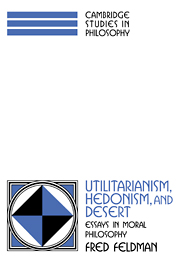6 - Mill, Moore, and the consistency of qualified hedonism
Published online by Cambridge University Press: 05 June 2012
Summary
INTRODUCTORY COMMENTS
The title of this essay suggests that it concerns the controversy about qualified hedonism. However, overt discussion of that controversy takes up just a tiny fraction of the paper. Most of the paper is devoted to a more fundamental issue – how to formulate an axiological theory, with a few versions of hedonism as the examples. I spend a lot of time trying to show that standard formulations of hedonism are so confused that it's pointless to consider whether they are consistent with each other, and so on.
The paper has some clearly “negative” aims. I want to show that typical formulations of hedonism are seriously defective. Thus, for example, I discuss the sort of formulation often encountered in the writings of Plato, Aristotle, Moore, and many others. These philosophers sometimes state the central thesis of hedonism by saying “Pleasure alone is intrinsically good.” The problem here is that “pleasure” seems to be a singular noun – the name of some feeling or some property. But this can't possibly be right. Hedonists do not want to say that there is exactly one intrinsically good thing. They want to say that lots of things are intrinsically good (this life, that world, the other consequence, many different experiences), and they want to say that these things have different intrinsic values and they occur at different times. So, formulations such as the ones cited must have the number wrong.
- Type
- Chapter
- Information
- Utilitarianism, Hedonism, and DesertEssays in Moral Philosophy, pp. 106 - 124Publisher: Cambridge University PressPrint publication year: 1997
- 1
- Cited by

